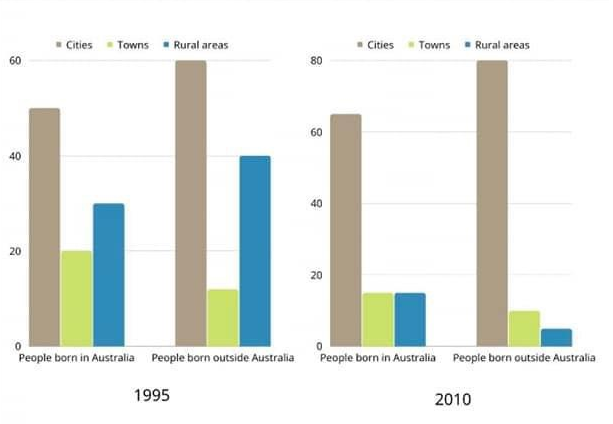[Minh P] Writing Practice Test 996333
Task 1
You should spend about 20 minutes on this task.
The bar chart below describes some changes about the percentage of people were born in Australia and who were born outside Australia living in urban, rural and town between 1995 and 2010.
Summarise the information by selecting and reporting the main features and make comparisons where relevant.
You should write at least 150 words.

The given bar chart illustrates how the proportion of accommodations, including cities, towns, and rural areas, between native Australians and foreign-native Australians changed over a period of 15 years, from 1995.
Overall, it is obvious that the number of city livers took up the highest point throughout this time. While in 2010, people significantly tent to leave towns and rural areas.
In 1995, the percentage of people born outside Australia living in cities reached the lion's share with 60%, while this figure for native Australians accounted for 50%. In the same year, the nuber of native Australians chose to live in towns was twofold compared to this rate of foreign Australians. On the contrary, people born in Australia and outside settled in rural areas occupied 30% and 40%, respectively.
Regarding to 2010, it is clearly that towns and rural areas suffered a dramatical drop in the number of citizens living, all of these figure accounted for no more than 20% of the total population. Meanwhile, the number of native and foreign Australians living in urban areas constituded the highest trend in that year, with over 60% and 80%, respectively.
Task 2
You should spend about 40 minutes on this task.
Rich countries often give money to poorer countries, but it does not solve poverty. Therefore, developed countries should give other types of help to the poor countries rather than financial aid. To what extent do you agree or disagree?
You should write at least 250 words.
In the last few decades, many have believed that prosperous countries giving capital to the poorer ones did not significantly solve poverty; therefore, governments ought to consider other ways to support undeveloped countries. Personally, I strongly agree with this statement for positive and negative reasons.
There are two main reasons why it is essential for governments to reconsider a more suitable way of investing support in difficult nations. First of all, it is obvious that raising funds is considered a form of short-term assistance, which means the food crisis cannot vanish entirely. For instance, receiving international aid in money seems to be hard to tackle starvation in the long run. Consequently, it may seriously lead to an economic recession among poorer countries. Moreover, because some money-driven people in the political systems still exist, those citizens must suffer unfair lives. Rich-country governments cannot know whether the amount of money invested is misused or not when sending it directly to these individuals.
Due to those practical warnings, prosperous countries must have other methods to give weak nations a hand in driving their starvation. To begin with, labor exports, particularly those with advanced degrees and extensive practical experience, should be prioritized. The more workers they give, the more likely the crisis proportion will drop. Besides that, providing quality resources of seeds as well as some tips to thrive in their agriculture is another effective way. As a result, poor country dwellers may no longer stand the scarcity of food. Last but not least, using these unparalleled methods can directly contribute to the growth of relationships among nations all over the world.
In conclusion, for the reasons I have mentioned above, I firmly believe that, apart from offering financial aid, wealthy nations can support the poorer through a variety of efficient techniques, such as providing workers, quality resources, etc.
Community’s feedback
Sorry! We couldn't find any contents.
Leaderboard:
| # | User | Score | Time | |
|---|---|---|---|---|
| Kento Nanami |  | 8.5 | 52:31 | |
| Nayef Alhajraf |  | 8.5 | 60:00 | |
| Ella Ruppo |  | 7.5 | 59:39 | |
| 4 | chengxi yu |  | 7.0 | 00:00 |
| 5 | avin chui |  | 7.0 | 59:11 |
| 6 | 癫 火 |  | 7.0 | 59:51 |
| 7 | Li Xuefeng |  | 6.5 | 03:46 |
| 8 | Chanisara Wongkongsang |  | 6.5 | 56:37 |
| 9 | Dan H |  | 6.0 | 50:41 |
| 10 | Carlo Di Giacomo |  | 6.0 | 60:00 |



